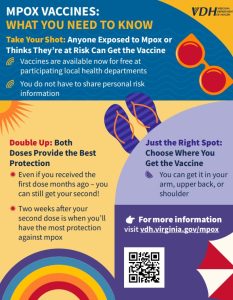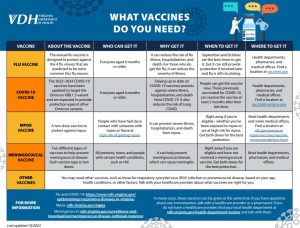Cases of mpox peaked in August 2022, but the outbreak is not over. CDC continues to receive reports of cases that reflect ongoing community transmission in the U.S. and internationally, and Virginia has had a recent increase in reported mpox cases.
To date, there have been more mpox cases reported to the Virginia Department of Health this year than in all of 2023. This recent increase in reported mpox cases in Virginia serves as a reminder for providers to continue to keep mpox in mind when evaluating patients and recommend JYNNEOS vaccine for people at risk. Please check the VDH mpox dashboard for the most up-to-date data.
VDH Provider Resources
Important Updates
The Democratic Republic of Congo (DRC) has experienced a large mpox outbreak with over 20,000 suspected cases and more than 1,000 deaths since January 1, 2023. On May 16, 2024, CDC released an MMWR, U.S. Preparedness and Response to Increasing Clade I Mpox Cases in the Democratic Republic of the Congo, stating "the increasing number of reported suspected clade I mpox cases in the Democratic Republic of the Congo (DRC) poses a global threat for potential spread. No clade I cases have been reported in countries without endemic transmission."
CDC is urging clinicians to be on alert for new mpox cases and encourage vaccination for people at risk. If mpox is suspected, test even if the patient was previously vaccinated or had mpox.
Clinicians should document travel history in patients suspected of having mpox and should contact the local health department if they’ve traveled to DRC or had contact with someone who traveled to DRC in the 21 days before symptom onset so that clade-specific testing can be performed. As of June 4, VDH’s Division of Consolidated Laboratory Services (DCLS) can perform clade-specific mpox testing.
Vaccines and treatments are expected to be effective for both Clade I and Clade II MPXV infections. Appropriate medical treatment is critical given the potential for severe illness, and contact tracing and containment strategies, including isolation, behavior modification, and vaccination, will be important to prevent spread if any U.S. Clade I mpox cases occur. Clinicians should also refamiliarize themselves with mpox symptoms, specimen collection, laboratory testing procedures, and treatment options. Diagnostic samples and clinical waste can be managed as Category B infectious substances unless they contain or are contaminated with cultures of Clade I MPXV.
For additional details on the DRC preparedness and response:
- CDC COCA Call: Mpox Update: Clinical Management and Outbreaks (Recorded 6/27/24)
- CDC MMWR: U.S. Preparedness and Response to Increasing Clade I Mpox Cases in the Democratic Republic of the Congo — United States, 2024
- National Emerging Special Pathogens Training and Education Center (NETEC) Situation Report: Mpox in the Democratic Republic of Congo.
On February 12, 2024, CDC sent a message urging clinicians to remain diligent about taking thorough patient sexual histories and recommending vaccination to those who are eligible.
If you are evaluating a patient suspected to have mpox, immediately report the suspected case to the local health department (LHD) using the Confidential Morbidity Report Portal (Epi-1) or telephone, even if testing is being conducted at a commercial laboratory.
General Information
VDH Clinician Outreach
Mpox screening, prevention, and treatment should be incorporated into routine sexual health and HIV services to ensure all patients are screened for mpox, assessed for risk factors, counseled on prevention measures, and evaluated for testing and treatment, if indicated. VDH’s Incorporating Mpox into Sexual Health and HIV Care resource has more information.
CDC Clinician Outreach
- CDC COCA Call: Mpox Update: Clinical Management and Outbreaks (Recorded 6/27/24) (7/5/2024)
- CDC Clinician Outreach and Communication Activity (COCA) Now: CDC Urges Mpox Vaccination for Those Eligible Given Continued U.S. Mpox Cases (2/12/2024)
- CDC Health Alert Network (HAN) Health Advisory: Mpox Caused by Human-to-Human Transmission of Monkeypox Virus with Geographic Spread in the Democratic Republic of the Congo (1/10/2024)
- CDC Health Alert Network (HAN) Health Update: Potential Risk for New Mpox Cases (5/15/2023)
- Previous Health Alert Network (HAN) Health Advisories (5/14/2023)
Testing
Commercial laboratory testing for mpox is available. VDH encourages providers to use commercial laboratories, but this testing is not free. The laboratories will bill private insurance, Medicaid, or Medicare for all testing performed. Providers may find the relevant CPT code for mpox virus testing on each commercial laboratory’s website. Providers who encounter any issues while trying to order testing should contact the laboratory’s client services.
Public health testing through the Division of Consolidated Laboratory Services (DCLS) continues to be available at no cost for patients who meet clinical and epidemiologic criteria, which includes clade-specific testing to distinguish Clade I and Clade II MPXV. Providers should consult with their LHD about clade specific testing.
Labs Conducting Testing and Supporting Information
Infection Prevention & Control
Patient Evaluation and Education
Vaccine
Featured Resources
*available in additional languages. View all communication resources in additional languages.
Last updated: July 5, 2024
Opens pdf to download
Opens document to download
Opens in a new window
External link will open in a new window. Click link to exit Virginia Department of Health Website.



